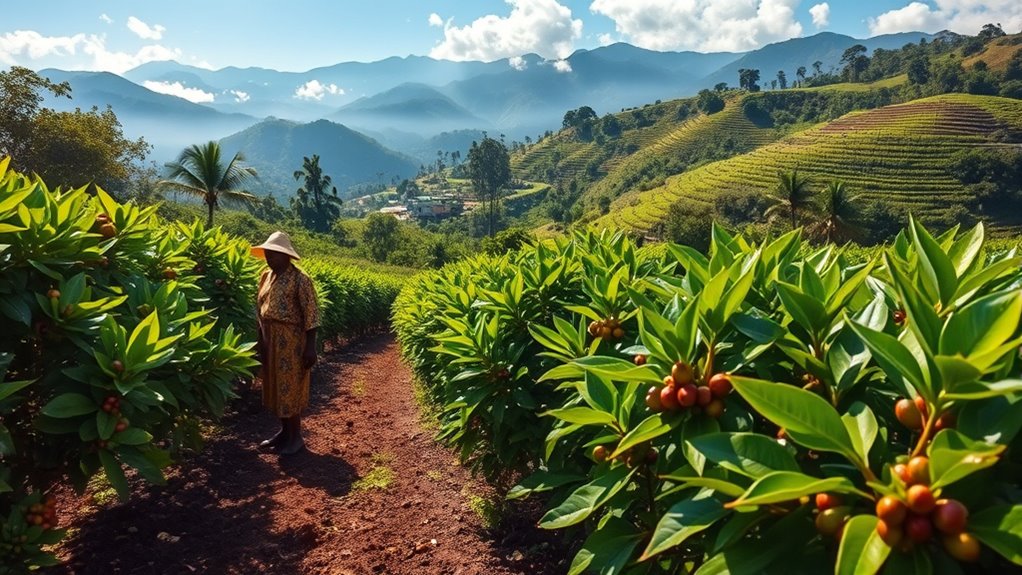Uganda’s coffee story has shifted from traditional robusta roots to embracing high-quality Arabica and specialty brews. With its fertile volcanic soils, the country now focuses on innovation, improving flavor, and diversifying its offerings. Government support and farmer training boost this transformation, positioning Uganda as a versatile player in global markets. If you want to explore how Uganda is creating a resilient, premium coffee industry, there’s more to uncover below.
Key Takeaways
- Uganda’s coffee history is rooted in robusta cultivation due to fertile soils and traditional farming practices.
- The industry is shifting toward diversification, including high-quality Arabica to meet global specialty coffee demands.
- Innovations in processing and varietal experimentation enhance flavor profiles and appeal to discerning international markets.
- Government and industry support promote sustainable practices, farmer training, and infrastructure to boost premium coffee production.
- Advanced technologies like AI are being adopted to improve quality control, market insights, and position Uganda as a versatile coffee exporter.

Have you ever wondered how Uganda became a prominent name in the global coffee industry? The story begins with the country’s rich history of coffee cultivation, rooted in robusta varieties that thrived in its fertile soils. Over time, Ugandan farmers and entrepreneurs recognized the potential to diversify their coffee offerings, leading to a strategic focus on coffee diversification. This shift wasn’t just about growing different types of beans; it was about creating a more resilient industry capable of competing in various export markets. By expanding beyond traditional robusta, Uganda aimed to meet the growing demand for specialty coffees worldwide, positioning itself as a versatile player in the global market.
Your journey into Uganda’s coffee scene reveals how the country’s commitment to quality and innovation opened new doors. As farmers began experimenting with different processing methods and varietals, they improved the flavor profiles of their beans, making them more appealing to discerning buyers. This focus on quality helped Uganda tap into export markets that value specialty Arabica coffees, which command higher prices and attract premium buyers. The country’s unique altitude, climate, and volcanic soils create ideal conditions for cultivating high-quality Arabica beans, allowing Uganda to move beyond its traditional robusta roots and establish a reputation for premium coffee. Incorporating AI-driven technologies such as natural language processing and automation in the industry can further enhance quality control and market insights.
The diversification efforts have also been driven by government support and industry cooperation. Local cooperatives and international organizations have invested in training farmers, improving processing infrastructure, and promoting sustainable practices. These initiatives have fostered a culture of innovation, encouraging farmers to explore new coffee varieties and techniques that enhance flavor, aroma, and consistency. As a result, Uganda has gained recognition for producing distinct coffee profiles, appealing to specialty markets around the world. This strategic emphasis on coffee diversification has helped the country reduce its dependency on a single coffee type, making its industry more adaptable to global market fluctuations. Additionally, leveraging resources and tools like research and development can further accelerate this growth trajectory.
Frequently Asked Questions
How Does Uganda’s Climate Influence Coffee Flavor Profiles?
You’ll notice that Uganda’s climate variability plays a big role in shaping coffee flavor profiles. The warm temperatures and distinct rainy seasons promote consistent flavor development, allowing the beans to mature slowly and develop complex notes. Higher altitudes and microclimates add unique nuances, making each harvest distinct. These climate factors, combined with careful cultivation, help produce coffees with vibrant acidity, rich aroma, and a well-rounded taste that reflects Uganda’s diverse environment.
What Are the Key Challenges Faced by Ugandan Coffee Farmers?
Like steering a stormy sea, you face many challenges as a Ugandan coffee farmer. Limited access to farmer cooperatives hampers resource sharing, while lack of coffee certification can reduce market value and buyer trust. Additionally, pests, unpredictable weather, and fluctuating prices threaten your livelihood. Overcoming these hurdles requires embracing cooperatives, pursuing certification, and adopting sustainable practices to secure better income and a resilient coffee industry.
How Does Uganda Ensure Sustainable Coffee Production?
You can guarantee sustainable coffee production by adopting eco-friendly practices like reducing chemical use, conserving water, and promoting soil health. Emphasizing sustainable farming methods, such as shade-grown coffee, helps protect biodiversity and maintain ecosystem balance. Supporting farmers with training and access to eco-friendly technology encourages responsible practices, ensuring long-term productivity. These efforts not only improve quality but also contribute to environmental preservation, securing Uganda’s coffee industry for future generations.
What Are the Main Export Markets for Ugandan Coffee?
Imagine Uganda’s coffee as a bridge connecting worlds; your main export markets include Europe, North America, and Asia. These regions value the high coffee quality and rely on efficient export logistics to guarantee freshness and flavor. By maintaining top standards, Uganda’s coffee reaches discerning consumers worldwide, strengthening its reputation. Your role in supporting quality and logistics helps preserve this essential connection, making Uganda a key player in the global coffee scene.
How Is Technology Transforming Coffee Farming in Uganda?
You see, technology is revolutionizing coffee farming in Uganda through precision farming and drone technology. With precision farming, you can optimize inputs like water and fertilizers, boosting yields and maintaining quality. Drones help you monitor crop health, identify pest issues early, and assess field conditions quickly. This tech-driven approach makes your coffee production more efficient, sustainable, and profitable, giving you a competitive edge in the global market.
Conclusion
Now that you’ve seen Uganda’s journey from robusta roots to specialty arabica, isn’t it inspiring to witness how passion and innovation transform a country’s coffee story? As you savor each cup, remember the hardworking farmers and the rich history behind every bean. Will you continue to support and celebrate Uganda’s thriving coffee industry, helping it reach even greater heights? Your appreciation can make a difference in this remarkable journey.









